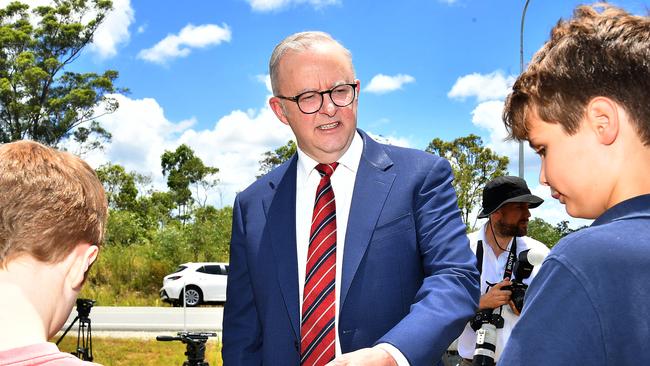Anthony Albanese quiet on revenue plans as income tax take set to hit 27-year high
Anthony Albanese has refused to reveal if he will be taking new tax changes to this year’s federal election, as workers are predicted to fund a greater share of government spending despite the early benefits of the stage three tax cuts.

Anthony Albanese has refused to reveal if he will be taking new tax changes to this year’s federal election, as workers are predicted to fund a greater share of government spending despite the early benefits of the stage three tax cuts.
With Peter Dutton also walking back his previous ambitions to deliver tax relief, it appears increasingly likely neither Labor nor the Coalition will head to the election with plans to overhaul the nation’s tax settings even as the federal budget is expected to remain in deficit for at least a decade.
The decision by both parties not to offer voters income tax cuts comes despite December’s mid-year budget update projecting workers will fund an increasing share of the federal tax take.
While taxpayers have received some reprieve under Labor’s revised stage three tax cuts, Treasury expects income taxes will still make up 52 per cent of total tax receipts in 2024-25.
That is down from 52.3 per cent recorded last financial year but still far above the 46.2 per cent average recorded in the decade after the GST was introduced in a move designed to reduce the budget’s reliance on taxing personal and company incomes.
From mid-2025, however, the contribution of personal income taxes to the commonwealth tax base is forecast to climb to 53.5 per cent – a 27-year-high – the mid-year budget update shows, as bracket creep and robust jobs growth fuel revenue receipts.
Starting the election year with a tour through regional Queensland and West Australian seats, the Prime Minister on Monday repeatedly refused to say if the government was considering new revenue measures to offset its spending promises.
Instead, he sought to assure voters his government’s spending would represent value for money for taxpayers.
“What we need to do is to make sure that every single dollar of expenditure is expenditure that is well worth it,” he told reporters in Gympie.
Taking aim at the opposition, which has accused the government of priming the economy with excessive expenditure and undermining the RBA’s inflation fight, Mr Albanese argued a Coalition government would press ahead with significant spending cuts.
“What that means is cuts to the indexing of pensions. That means cuts to infrastructure. It means cuts to the cheaper medicines … It means abolition of the Future Made in Australia program of jobs and manufacturing and making things here in Queensland,” he said.
“What we do is make sure that we deliver. That’s why we’ve been responsible. That’s why in the (Expenditure Review Committee) that (Treasurer) Jim Chalmers and (Finance Minister) Katy Gallagher preside over so well, we make sure that we go through line by line to make sure that value is there for taxpayers.”
But economist Saul Eslake warned the government had become overly dependent on levying personal incomes, with its reliance discouraging it from finding more efficient and equitable means of raising revenue.
“Politicians get a government collecting extra tax without explicitly legislating for it … while young people are adversely affected,” Mr Eslake said. “Young people are much more likely to earn income in the form of wages and salaries, and less likely to be in the form of investment income,” he said. “There is a generational inequity with our tax system.”
At the same time as the budget grows increasingly reliant on income taxes, the contribution of GST collections to the federal tax base is expected to remain at a near- record low.
After falling to just 13.4 per cent of the overall tax mix in the 2023-24 financial year, the mid-year budget update forecast the GST’s contribution to stabilise at 14.1 per cent by 2027-28. That remains well below the 15.5 per cent average contribution during the first decade of its operation.
Robert Carling, a fiscal policy and taxation expert at the Centre for Independent Studies, a centre-right think tank, pinned the slide in GST revenue on consumer behaviour. “The composition of consumer spending is shifting towards items that are not subject to the GST – to health and education and so on,” Mr Carling said. “The only way to change that is to increase the rate on things that are subject to it or to broaden its base.”
Refusing to announce any new tax plans, Mr Albanese instead confirmed Labor would press ahead with its planned tax hike on high-balance superannuation accounts, as the policy – one of its few planned revenue-raising measures – remains stalled in the Senate and is unlikely to pass before the election.
“It’s still sitting before the Senate,” Mr Albanese exclaimed. “We hope that the Senate (will) come to their senses and stop representing just a small minority of people and represent the national interest.”
If passed, the changes would double the tax rate on earnings of super accounts worth more than $3m from 15 per cent to 30 per cent.
The measure is slated to take effect from July 2025 and is projected to raise $2.3bn in 2027-28 once it fully takes effect.
The changes face opposition from the Greens and Coalition.



To join the conversation, please log in. Don't have an account? Register
Join the conversation, you are commenting as Logout